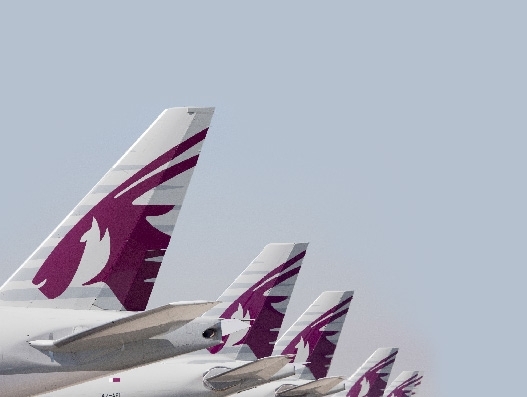
FROM MAGAZINE: The middle power
Despite blockade, the freight division of Doha-based Qatar Airways is making huge progress, certainly at a higher cost. But QR Cargo could soon be the world's top cargo carrier Reji John It is difficult to miss the conspicuous image of the oryx that appears in bright maroon colour in the tailfins of planes belonging to […]

Despite blockade, the freight division of Doha-based Qatar Airways is making huge progress, certainly at a higher cost. But QR Cargo could soon be the world's top cargo carrier
Reji John
It is difficult to miss the conspicuous image of the oryx that appears in bright maroon colour in the tailfins of planes belonging to Qatar Airways, the flag carrier of Qatar. Native to desert areas of the Arabian Peninsula, the Arabian oryx was classified as endangered on the International Union for Conservation of Nature (IUCN) Red List in 1986. However, in 2011 it became the first animal to revert to vulnerable status after previously being listed as extinct in the wild. A strange similarity can easily be drawn between the oryx and the current political scenario in the country, both struggling sturdily to gain their grandeur and dignity back.
Arabian oryx is the national animal of Qatar. However, it is also the national animal of the United Arab Emirates and Bahrain, two of the biggest adversaries among the four Arab countries who, in June 2017, severed diplomatic and trade relations with Qatar, closing land, air and sea links, as they accused Doha of supporting terrorism and violating a 2014 agreement with members of the Gulf Cooperation Council (GCC). Overnight, planes and cargo ships heading for Qatar were diverted, all diplomatic links were cut and Qatar’s sole land border, with Saudi Arabia, was closed. Even camels were not spared the politics. It was reported that 12,000 Qatari animals were forcibly repatriated.
The aim of the blockade – which came with a 10-day ultimatum of 13 unlikely demands – seemed essentially a political attempt to bring the wealthiest peninsula on the planet to its knees. However, with more than 15 months into the blockade, which Qatar calls “illegal”, what unfolds now is just the opposite. Far from destabilising Qatar, which has the highest per capita income in the world, this sovereign and independent state in the Middle East demonstrated remarkable resilience and continue to do the same.
Qatari resilience was bold in how the national flag carrier ensured that the country remained connected with the rest of the world even when it lost access to 18 cities in the blockading nations and was forced to re-route its flights over Turkey, Iran and Oman resulting huge spike in operational cost. The freight division of Qatar Airways ensured that the Qataris had adequate supply of all essential commodities. Ironically, Qatar Airways Cargo had its best performance in the most challenging year in its 20-year history. Last month Qatar Airways published its annual report for fiscal 2018 (1 April 2017 to 31 March 2018), which demonstrates the airline’s strength and resilience in the face of adversity. The airline reiterated its determination and commitment to growth without hiding the apparent concerns that it will underperform if the blockade continues.
For Qatar Airways, overall revenue and other operating income grew 7.22 percent annually compared to capacity (Available Seat Kilometres) growth of 9.96 percent. Lower revenue growth was directly attributable to the illegal blockade, which impacted departing seats by 19 percent. Cargo revenue witnessed very impressive growth of 34.4 percent against cargo capacity (Available Tonne Kilometres) growing 13.95 percent annually.
Three months into the blockade, in September 2017, Qatar Airways Cargo decided to add two Boeing 747-8F aircraft, which are now supporting Qatar Airways Cargo’s rapidly growing freight business. Today it is the second largest international cargo operator in the world, second only to Emirates SkyCargo. According to the numbers published by the International Air Transport Association's (IATA) World Air Transport Statistics for the year 2017, Emirates SkyCargo carried 2,646,000 tonnes of cargo as against Qatar Airways Cargo, which is at close second with 2,038,000 tonnes. While Emirates recorded a 4.2 percent growth year-on-year, the rate of growth for Qatar Airways was at 15.5 percent. Therefore, it will hardly be a surprise if the Doha-based carrier claims the top slot when numbers for the current fiscal come in. With a fleet of 23 young aircraft, Qatar Airways Cargo is one of the most important divisions in the Qatar Airways Group, making a significant contribution to the company’s overall success.
“Thanks to our robust business planning, swift actions in the face of the crisis, our passenger-focused solutions and dedicated staff, the impact has been minimised – and has certainly not been as negative as our neighbouring countries may have hoped for,” said Akbar Al Baker, group chief executive of Qatar Airways.
The blockade is into its second year and mediation efforts have so far failed to end the diplomatic dispute. It is a fact that for its size, Qatar wields disproportionate influence in the world and has been identified as a middle power.

